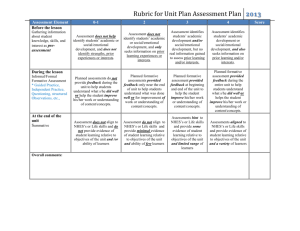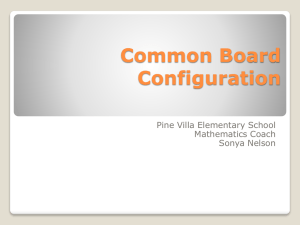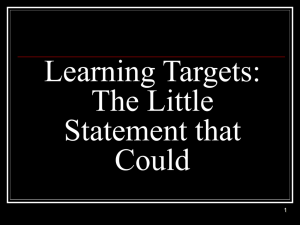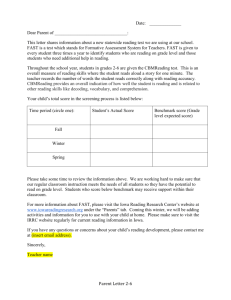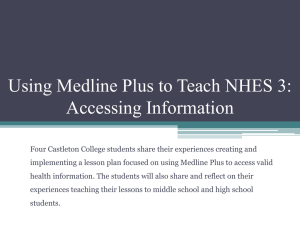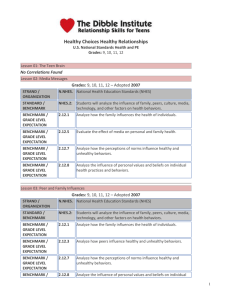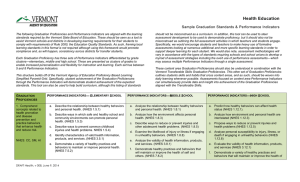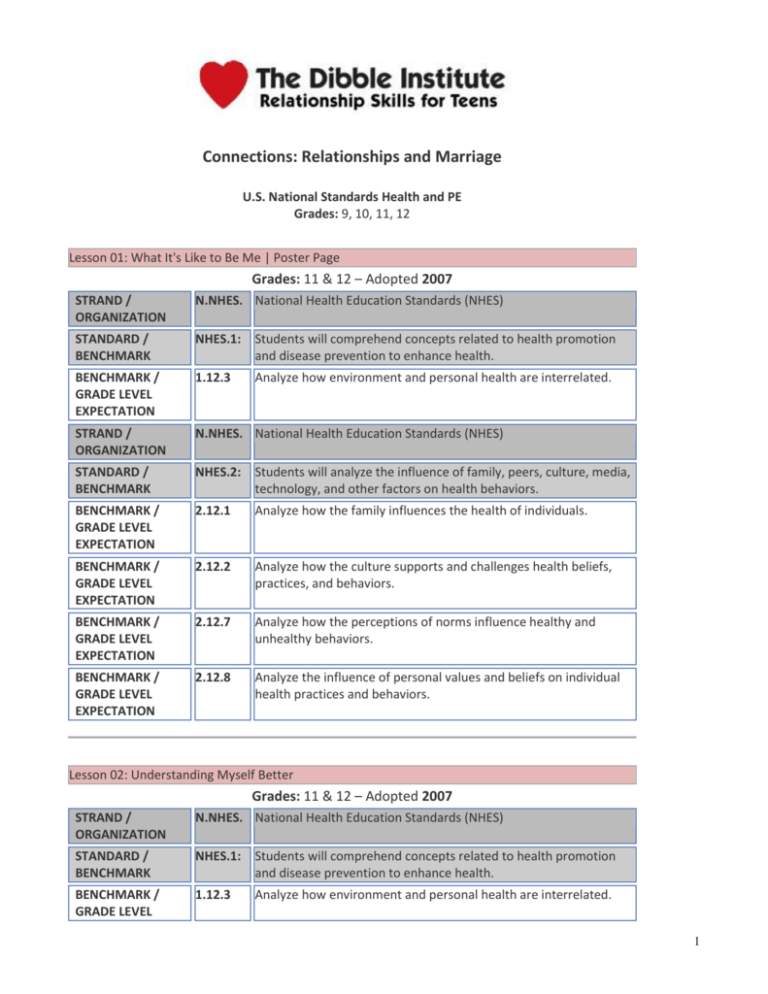
Connections: Relationships and Marriage
U.S. National Standards Health and PE
Grades: 9, 10, 11, 12
Lesson 01: What It's Like to Be Me | Poster Page
Grades: 11 & 12 – Adopted 2007
STRAND /
ORGANIZATION
N.NHES. National Health Education Standards (NHES)
STANDARD /
BENCHMARK
NHES.1:
Students will comprehend concepts related to health promotion
and disease prevention to enhance health.
BENCHMARK /
GRADE LEVEL
EXPECTATION
1.12.3
Analyze how environment and personal health are interrelated.
STRAND /
ORGANIZATION
N.NHES. National Health Education Standards (NHES)
STANDARD /
BENCHMARK
NHES.2:
Students will analyze the influence of family, peers, culture, media,
technology, and other factors on health behaviors.
BENCHMARK /
GRADE LEVEL
EXPECTATION
2.12.1
Analyze how the family influences the health of individuals.
BENCHMARK /
GRADE LEVEL
EXPECTATION
2.12.2
Analyze how the culture supports and challenges health beliefs,
practices, and behaviors.
BENCHMARK /
GRADE LEVEL
EXPECTATION
2.12.7
Analyze how the perceptions of norms influence healthy and
unhealthy behaviors.
BENCHMARK /
GRADE LEVEL
EXPECTATION
2.12.8
Analyze the influence of personal values and beliefs on individual
health practices and behaviors.
Lesson 02: Understanding Myself Better
Grades: 11 & 12 – Adopted 2007
STRAND /
ORGANIZATION
N.NHES. National Health Education Standards (NHES)
STANDARD /
BENCHMARK
NHES.1:
Students will comprehend concepts related to health promotion
and disease prevention to enhance health.
BENCHMARK /
GRADE LEVEL
1.12.3
Analyze how environment and personal health are interrelated.
1
EXPECTATION
STRAND /
ORGANIZATION
N.NHES. National Health Education Standards (NHES)
STANDARD /
BENCHMARK
NHES.2:
Students will analyze the influence of family, peers, culture, media,
technology, and other factors on health behaviors.
BENCHMARK /
GRADE LEVEL
EXPECTATION
2.12.1
Analyze how the family influences the health of individuals.
BENCHMARK /
GRADE LEVEL
EXPECTATION
2.12.2
Analyze how the culture supports and challenges health beliefs,
practices, and behaviors.
BENCHMARK /
GRADE LEVEL
EXPECTATION
2.12.7
Analyze how the perceptions of norms influence healthy and
unhealthy behaviors.
BENCHMARK /
GRADE LEVEL
EXPECTATION
2.12.8
Analyze the influence of personal values and beliefs on individual
health practices and behaviors.
Lesson 03: Your Plan for Life (with timeline)
Grades: 11 & 12 – Adopted 2007
STRAND /
ORGANIZATION
N.NHES. National Health Education Standards (NHES)
STANDARD /
BENCHMARK
NHES.6:
Students will demonstrate the ability to use goal-setting skills to
enhance health.
BENCHMARK /
GRADE LEVEL
EXPECTATION
6.12.2
Develop a plan to attain a personal health goal that addresses
strengths, needs, and risks.
BENCHMARK /
GRADE LEVEL
EXPECTATION
6.12.3
Implement strategies and monitor progress in achieving a personal
health goal.
BENCHMARK /
GRADE LEVEL
EXPECTATION
6.12.4
Formulate an effective long-term personal health plan.
STRAND /
ORGANIZATION
N.NASPE. National Standards for Physical Education (NASPE)
STANDARD /
BENCHMARK
NASPE.2. Demonstrates understanding of movement concepts, principles,
strategies, and tactics as they apply to the learning and
performance of physical activities.
BENCHMARK /
GRADE LEVEL
EXPECTATION
High school students demonstrate knowledge and understanding
necessary to develop scientifically based personal activity plans that
include selected sports and activities. They use complex movement
concepts and principles to independently refine their skills and apply them
to the learning of new skills. Advanced activity related to disciplinespecific knowledge is integrated so that students develop the ability to
learn, self-assess, and improve movement skills independently. They also
can recognize elite-level performance.
2
GRADE LEVEL
EXPECTATION
2.2.
Develops realistic short-term and long-term personal fitness goals.
STRAND /
ORGANIZATION
N.NASPE. National Standards for Physical Education (NASPE)
STANDARD /
BENCHMARK
NASPE.4. Achieves and maintains a health-enhancing level of physical fitness.
Young adults assume greater self-responsibility in their lives and display
greater autonomy in their personal behaviors. They demonstrate
responsibility for their own health-related fitness status by participating in
appropriate physical activities on a regular basis. They engage in activities
in a variety of settings (e.g., school, home, workplace, community) for the
purpose of achieving and maintaining health-related fitness. They are
largely independent in assessing their personal fitness status, and they
can interpret information from fitness tests and use this information to
plan and design their own programs to achieve and maintain personal
fitness goals that encompass all components of fitness.
BENCHMARK /
GRADE LEVEL
EXPECTATION
GRADE LEVEL
EXPECTATION
4.3.
Develops a personal fitness profile on the basis of fitness
assessment results.
GRADE LEVEL
EXPECTATION
4.4.
Designs and implements a personal fitness program based on
information obtained from the fitness assessment and in
accordance with appropriate training principles.
GRADE LEVEL
EXPECTATION
4.5.
Achieves personal fitness goals after a period of training.
GRADE LEVEL
EXPECTATION
4.6.
Demonstrates ability to monitor and adjust a personal fitness
program to meet needs and goals.
GRADE LEVEL
EXPECTATION
4.7.
Meets the age- and gender-specific health-related fitness standards
defined by Fitnessgram.
Lesson 04: Behind the Scenes | Positive Relationships | Male & Female Media Models
Grades: 11 & 12 – Adopted 2007
STRAND /
ORGANIZATION
N.NHES. National Health Education Standards (NHES)
STANDARD /
BENCHMARK
NHES.2:
Students will analyze the influence of family, peers, culture, media,
technology, and other factors on health behaviors.
BENCHMARK /
GRADE LEVEL
EXPECTATION
2.12.7
Analyze how the perceptions of norms influence healthy and
unhealthy behaviors.
BENCHMARK /
GRADE LEVEL
EXPECTATION
2.12.8
Analyze the influence of personal values and beliefs on individual
health practices and behaviors.
Lesson 05: Check the Status | Things Change
No Correlations Found
3
Lesson 06: Expectations
Grades: 11 & 12 – Adopted 2007
STRAND /
ORGANIZATION
N.NHES. National Health Education Standards (NHES)
STANDARD /
BENCHMARK
NHES.2:
Students will analyze the influence of family, peers, culture, media,
technology, and other factors on health behaviors.
BENCHMARK /
GRADE LEVEL
EXPECTATION
2.12.2
Analyze how the culture supports and challenges health beliefs,
practices, and behaviors.
BENCHMARK /
GRADE LEVEL
EXPECTATION
2.12.7
Analyze how the perceptions of norms influence healthy and
unhealthy behaviors.
BENCHMARK /
GRADE LEVEL
EXPECTATION
2.12.8
Analyze the influence of personal values and beliefs on individual
health practices and behaviors.
STRAND /
ORGANIZATION
N.NHES. National Health Education Standards (NHES)
STANDARD /
BENCHMARK
NHES.4:
Demonstrate the ability to use interpersonal communication skills
to enhance health and avoid or reduce health risks.
BENCHMARK /
GRADE LEVEL
EXPECTATION
4.12.1
Use skills for communicating effectively with family, peers, and
others to enhance health.
BENCHMARK /
GRADE LEVEL
EXPECTATION
4.12.3
Demonstrate strategies to prevent, manage, or resolve
interpersonal conflicts without harming self or others.
Lesson 07: Attractions | Getting Acquainted
No Correlations Found
Lesson 08: Dating and Emotions | Breaking Up | My Ideal Person
No Correlations Found
Lesson 09: Family Patterns | Settling Differences
Grades: 11 & 12 – Adopted 2007
STRAND /
ORGANIZATION
N.NHES. National Health Education Standards (NHES)
STANDARD /
BENCHMARK
NHES.2:
Students will analyze the influence of family, peers, culture, media,
technology, and other factors on health behaviors.
4
BENCHMARK /
GRADE LEVEL
EXPECTATION
2.12.1
Analyze how the family influences the health of individuals.
STRAND /
ORGANIZATION
N.NHES. National Health Education Standards (NHES)
STANDARD /
BENCHMARK
NHES.4:
Demonstrate the ability to use interpersonal communication skills
to enhance health and avoid or reduce health risks.
BENCHMARK /
GRADE LEVEL
EXPECTATION
4.12.1
Use skills for communicating effectively with family, peers, and
others to enhance health.
BENCHMARK /
GRADE LEVEL
EXPECTATION
4.12.3
Demonstrate strategies to prevent, manage, or resolve
interpersonal conflicts without harming self or others.
Lesson 10: Let's Talk | Listening | Types of Filters
Grades: 11 & 12 – Adopted 2007
STRAND /
ORGANIZATION
N.NHES. National Health Education Standards (NHES)
STANDARD /
BENCHMARK
NHES.4:
Demonstrate the ability to use interpersonal communication skills
to enhance health and avoid or reduce health risks.
BENCHMARK /
GRADE LEVEL
EXPECTATION
4.12.1
Use skills for communicating effectively with family, peers, and
others to enhance health.
Lesson 11: Handling Conflict
Grades: 11 & 12 – Adopted 2007
STRAND /
ORGANIZATION
N.NHES. National Health Education Standards (NHES)
STANDARD /
BENCHMARK
NHES.4:
Demonstrate the ability to use interpersonal communication skills
to enhance health and avoid or reduce health risks.
BENCHMARK /
GRADE LEVEL
EXPECTATION
4.12.1
Use skills for communicating effectively with family, peers, and
others to enhance health.
BENCHMARK /
GRADE LEVEL
EXPECTATION
4.12.3
Demonstrate strategies to prevent, manage, or resolve
interpersonal conflicts without harming self or others.
Lesson 12: Components of Relationships | What Is Love?
No Correlations Found
5
Lesson 13: Roadblocks to Relationships | Compatibility Counts Before You Marry
No Correlations Found
Lesson 14: Priorities | Household Duties | What About Kids?
No Correlations Found
Lesson 15: Making the Decision | Rate Your Mate |The Wedding Marriage License
No Correlations Found
Lesson 16: A Portrait | Parenting 101 | Family Album
No Correlations Found
Lesson 17: Finances | The Family Budget | Keeping a Job
No Correlations Found
Lesson 18: Our Crisis
No Correlations Found
Lesson 19: Family Vacation
No Correlations Found
Lesson 20: What I Learned
© 2012, EdGate Correlation Services, LLC. All Rights reserved.
For more information on Connections: Relationships and Marriage please contact:
The Dibble Institute
www.dibbleinstitute.org
800-695-7975
6

